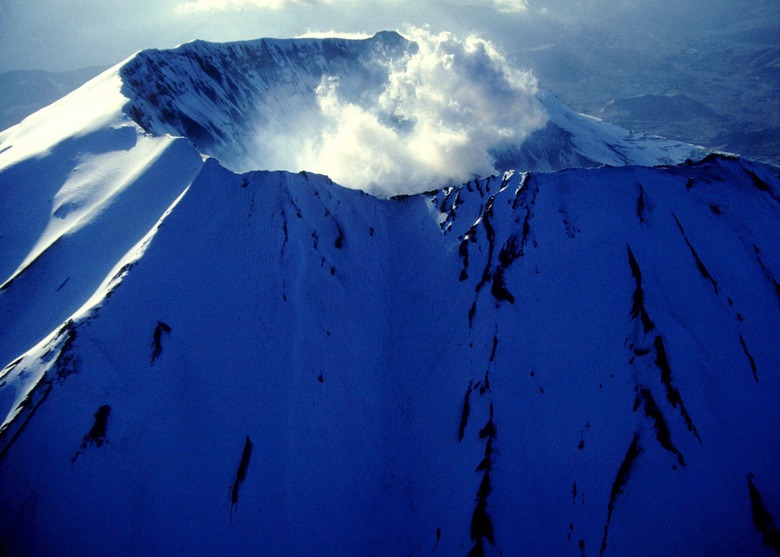Do Volcanoes Pollute The Atmosphere?
As molten lava spews from an erupting volcano, it destroys everything in its path, often forcing residents to abandon their land forever. While this type of devastation is usually confined to the area surrounding the volcano, eruptions can also affect people living hundreds or even thousands of kilometers away. Far from the eruption site, volcanic gases and fine particles pollute the atmosphere, resulting in reduced air quality, acid rain and other environmental concerns.
Volcanic Gases
Volcanic Gases
In addition to rock and lava, volcanoes release gases that can pollute the air. These gases may travel 10 kilometers (6.2 miles) into the air or more, then blow hundreds or thousands of kilometers away from the site of the volcano to affect air quality across a broad area. This cloud of volcanic gases settles over the land like smog, and actually has its own nickname — vog — short for "volcanic smog." People exposed to these gases may suffer from irritated eyes, skin or lungs. Some of these gases, including sulfur dioxide and hydrogen chloride, may combine with moisture in the atmosphere and fall to the ground as acid rain. Acid rain not only damages property like cars and buildings but also pollutes the water, harming marine life and ecosystems.
Volcanic Ash
Volcanic Ash
Like volcanic gases, volcanic ash made up of rock, sand and silt can travel thousands of kilometers away from the site of a volcano. These tiny particles are abrasive, like blowing sand, and can contribute to air pollution. People who inhale volcanic ash may experience short-term effects like eye, skin, nose and throat irritation. Silica, a type of particle sometimes found in volcanic ash, could also lead to long-term health effects, according to the U.S. Geological Survey. When inhaled, silica could potentially cause scarring in the lungs, a condition known as silicosis.
Carbon Dioxide
Carbon Dioxide
While volcanic gases do pollute the air, they play only a small role in global warming. When people burn fuels like oil or coal to power factories or cars, these fuels produce a byproduct called carbon dioxide, which travels into the Earth's atmosphere. Heat energy from the sun gets trapped in this layer of carbon dioxide, resulting in increased temperatures on Earth, a concept known as global warming. While it's true that volcanoes spew carbon dioxide, the amount of this gas released by volcanoes is equivalent to just 1 percent of all the carbon dioxide produced by human activities, according to the U.S. Geological Survey.
Sulfur Dioxide
Sulfur Dioxide
Volcanoes do more than pollute the air. In fact, volcanic activity may actually benefit the environment in some cases. While carbon dioxide gases from volcanoes join other carbon emissions in the atmosphere and contribute to global warming, the sulfur dioxide released by volcanoes can actually reverse this effect. Sulfur dioxide forms a shield in the atmosphere, reflecting heat energy back away from the Earth, which helps to slow the effects of global warming and climate change.
Cite This Article
MLA
Beach, Emily. "Do Volcanoes Pollute The Atmosphere?" sciencing.com, https://www.sciencing.com/volcanoes-pollute-atmosphere-4707/. 24 April 2017.
APA
Beach, Emily. (2017, April 24). Do Volcanoes Pollute The Atmosphere?. sciencing.com. Retrieved from https://www.sciencing.com/volcanoes-pollute-atmosphere-4707/
Chicago
Beach, Emily. Do Volcanoes Pollute The Atmosphere? last modified March 24, 2022. https://www.sciencing.com/volcanoes-pollute-atmosphere-4707/
